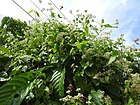Note: This is a project under development. The articles on this wiki are just being initiated and broadly incomplete. You can Help creating new pages.
Mikania cordata
Mikania micrantha is a tropical plant in the Asteraceae known as bitter vine, climbing hemp vine, or American rope. It is also sometimes called mile-a-minute vine (a moniker also used for the unrelated Persicaria perfoliata). It is a vigorously growing perennial creeper that grows best in areas in high humidity, light and soil fertility, though it can adapt in less fertile soils.
Contents
- 1 Uses
- 2 Parts Used
- 3 Chemical Composition
- 4 Common names
- 5 Properties
- 6 Habit
- 7 Identification
- 8 List of Ayurvedic medicine in which the herb is used
- 9 Where to get the saplings
- 10 Mode of Propagation
- 11 How to plant/cultivate
- 12 Commonly seen growing in areas
- 13 Photo Gallery
- 14 References
- 15 External Links
Uses
Poultice for swellings, Itches, Wounds, Snake and Scorpion bites.
Parts Used
Chemical Composition
The chemical components of volatile oil from Mikania micrantha were analyzed by GC/MS. Twenty-two compounds were identified, and monoterpenes and sesquiterpenes as well as alcohol and ketone with their derivatives were major components. Biological activity of volatile oil on insect was investigated. [1]
Common names
| Language | Common name |
|---|---|
| Kannada | |
| Hindi | |
| Malayalam | |
| Tamil | |
| Telugu | |
| Marathi | NA |
| Gujarathi | NA |
| Punjabi | NA |
| Kashmiri | NA |
| Sanskrit | |
| English | Climbing Hempweed, American rope, Bittervine, Chinese creeper, Mikania vine |
Properties
Reference: Dravya - Substance, Rasa - Taste, Guna - Qualities, Veerya - Potency, Vipaka - Post-digesion effect, Karma - Pharmacological activity, Prabhava - Therepeutics.
Dravya
Rasa
Guna
Veerya
Vipaka
Karma
Prabhava
Habit
Identification
Leaf
| Kind | Shape | Feature |
|---|---|---|
| Simple | Heart-shaped base | 4–13-centimetre (1.6–5.1 in) long |
Flower
| Type | Size | Color and composition | Stamen | More information |
|---|---|---|---|---|
| Unisexual | 4.5–6.0-millimetre (0.18–0.24 in) | white | Individual florets are white to greenish-white, 4 in each head. |
Other features
List of Ayurvedic medicine in which the herb is used
Where to get the saplings
Mode of Propagation
How to plant/cultivate
A plant of the moist tropics, where it is found at elevations up to 2,000 metres. It grows best in areas where annual daytime temperatures are within the range 22 - 28°c, but can tolerate 13 - 38°c. It prefers a mean annual rainfall in the range 2,000 - 2,500mm, but tolerates 1,500 - 3,500mm. Grows best in full sun but tolerates light shade. Succeeds in a range of soils of moderate fertility. Prefers a rich, damp soil. Prefers a pH in the range 4.5 - 5.5, tolerating 4 - 7. [3]
Commonly seen growing in areas
Photo Gallery
References
External Links
- Ayurvedic Herbs known to be helpful to treat Poultice for swellings
- Ayurvedic Herbs known to be helpful to treat Itches
- Ayurvedic Herbs known to be helpful to treat Wounds
- Ayurvedic Herbs known to be helpful to treat Snake and Scorpion bites
- Herbs with Leaves used in medicine
- Herbs with common name in English
- Habit - Tree
- Index of Plants which can be propagated by Seeds
- Herbs that are commonly seen in the region of grasslands
- Herbs
- Asteraceae



